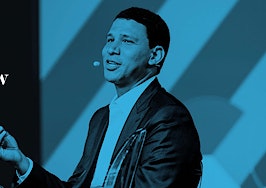Real estate has long been associated with tall buildings and even taller egos, but recent comments from a high-profile industry leader highlight a growing view that humility, not arrogance, may actually be the most profitable modus operandi in the business.
The comments came from Compass CEO Robert Reffkin, who in an interview with Inman expressed regret about the public tone his company had recently adopted. Reffkin said the language was “not who we are as a company” nor was it “who I am as a person.”
“I think it was arrogant and didn’t reflect the values I hold as an individual or any of the motivations that I or the company had,” he explained. “I think the language from the marketing became about being everywhere and winning and there’s nothing about my motivation that has to do with winning or being everywhere.”
Reffkin, who is among the most talked-about CEOs of the real estate startup world, has been fond of describing his company as unique and transformative as it gobbles up market share around the U.S. Such comments were fairly par for the course in an industry dominated by big dealmaking and billionaires — one of whom unapologetically used his real estate braggadocio to win the presidency.
Ryne Sherman, chief science officer for Hogan Assessments, said that approach appears to be growing in U.S. businesses right now.
“Narcissism has invaded the corporate culture all the way down,” he told Inman. “It’s not just at the CEO level.”
Hogan Assessments develops personality tests that Fortune 500 companies use to evaluate job seekers. In 2019, the company plans to roll out a new scale meant to evaluate humility.
Sherman said humility is a quality that has been poorly measured in the past, and is still not adequately valued; earlier this summer, for example, Hogan Assessments researched U.S. job listings and found about 250,000 positions looking for “charisma” but only 3,000 mentioning “humility.”
Sherman attributed a growth in arrogance in business to changes in executive pay, which has skyrocketed in recent decades. Now, he explained, there are huge financial incentives for people to make big, brash promises — even if that isn’t actually a good long-term strategy.
“What happens is people don’t want to work for those people,” Sherman said. “They alienate the staff or the team.”
In that context, Reffkin’s comments appear to offer something of a course correction, potentially steering Compass toward a gentler, less aggressive tone than the one that dominates the sector. And that’s an approach that could ultimately be more profitable, according to members of the real estate industry.
Don Kottick, executive vice president of corporate development for Peerage Realty Partners, told Inman that corporate culture is a key component of success in the real estate industry and that “the humble approach is much stronger.”
“When you’re brash you’re probably ruling by intimidation,” Kottick said. “When you’re humble you instill that sense of culture to your people. They’re more likely to follow you and they’re more likely to work harder.”
Kottick acknowledged that there are “a lot of egos in this business,” perhaps in part because it is an industry filled with entrepreneurs. But he also speculated that there is a shift taking place away from the more dictatorial “cult of the individual” toward a more collaborative style of doing business.
Sara Sutachan, the California Association of Realtors’ vice president of industry relations and strategic initiatives, agreed that a brash business approach is counterproductive.
“I think effective leaders today know the power is in their people,” she added. “I think that shows through in their profit and their margins.”
Recent research bears that out, with multiple papers over the last decade showing that humility can be linked to less job turnover and more workplace honesty.
In real estate, it can also be the difference between making a deal and having it fall through.
John H. Banks, president of the Real Estate Board of New York, pointed out that communication is a key part of the real estate profession. Agents, brokers, and developers often have to juggle the concerns of politicians, business leaders and sometimes-reluctant community members. Listening and being respectful, Banks explained, is the key to getting things done.
“If you’re in an open communicative state and have a track record of working with communities, they’ll listen,” he said. “It’s absolutely important.”







